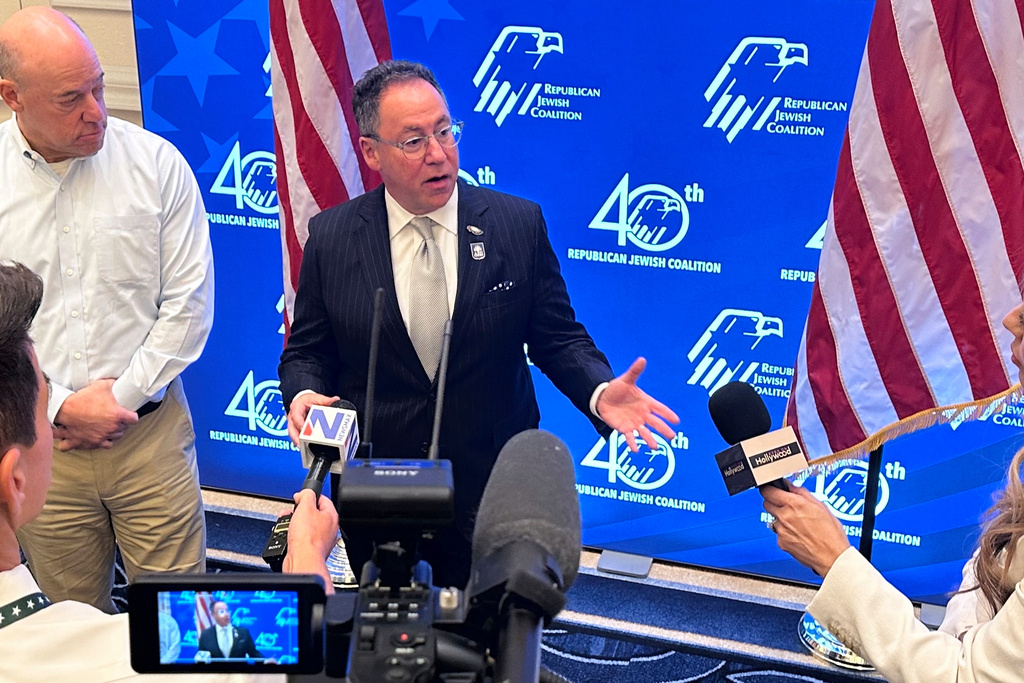
Rising Concerns Over Antisemitism in the GOP
The recent conference of the Republican Jewish Coalition in Las Vegas has become a focal point for growing concerns about the rise of antisemitism within the Republican Party. What was initially expected to be a celebration of a fragile ceasefire in the Middle East turned into a powerful call to action against anti-Jewish sentiments that are gaining traction among some factions of the party.
This shift in tone was highlighted by the defense of Tucker Carlson, a prominent talk show host, by a leading conservative think tank president. Carlson's decision to invite a far-right activist with known antisemitic views onto his podcast sparked widespread criticism. The event served as a catalyst for many speakers at the conference to address the need for the GOP to confront and eliminate elements that promote hatred toward Jewish people.
Despite the somber atmosphere, the conference brought together over 1,000 attendees, including elected officials, fundraisers, media personalities, and activists. Their unified message emphasized the importance of condemning antisemitism and working towards a more inclusive and respectful political environment.
A Divided Party and Growing Tensions
The meeting underscored the deepening divide within the Republican Party regarding its stance on Israel and its relationship with the United States. While there was a shared commitment to combatting antisemitism, the discussions revealed significant differences in how members view the future of U.S.-Israel relations.
Republican Jewish Coalition leader Matthew Brooks described the current situation as an "undeclared civil war" within the party, particularly concerning Israel and the Jewish community. This sentiment was echoed by other speakers who called for immediate action to address the issue before it escalates further.
Brooks also pointed to other figures contributing to this division, including Georgia Representative Marjorie Taylor Greene and conservative social media personality Candace Owens. He stressed the importance of addressing these challenges proactively to prevent them from becoming more entrenched within the party.
Addressing the Threat
Tennessee Representative David Kustoff expressed concern over the presence of antisemitism on the fringes of the party, while Florida Representative Byron Donalds made a strong statement against such behavior. However, not all perspectives were as serious. South Carolina Senator Lindsay Graham attempted to lighten the mood by joking about being part of the “Hitler-sucks wing” of the Republican Party. Despite the humor, he downplayed the threat posed by figures like Nick Fuentes, emphasizing that while individuals can express their views freely, they must not embrace extremist ideologies if they seek to run for office.
The growing influence of younger, far-right voices within the party has raised alarms. Recent leaks of Telegram messages from National Young Republican leaders expressing admiration for Hitler and making jokes about gas chambers have only intensified these concerns. These incidents highlight the urgent need for the party to address and counteract such harmful rhetoric.
A Celebration Amidst Challenges
Despite the serious discussions, the conference also featured moments of joy and hope. Attendees celebrated the release of Israeli hostages held for over two years following the October 7, 2023, attack by Hamas. Many spoke emotionally about the resilience of Israel’s people and the relief of reuniting with loved ones.
Former Minnesota Senator Norm Coleman praised the emotional impact of the event, noting the collective pride and relief felt by the Jewish community. The conference also included testimonials about former President Donald Trump’s role in brokering the ceasefire that led to the return of the hostages. His recorded speech, which declared him as "a greater friend to Israel than anyone else," was met with enthusiastic applause.
However, even this optimism was tempered by questions about the sustainability of the ceasefire. Some coalition members expressed doubts about its long-term viability, especially after Israel resumed strikes in Gaza following allegations of violations by Hamas. Board member Bobby Schostak suggested that achieving lasting peace would take years, while Coleman urged the complete eradication of Hamas, highlighting the complex challenges ahead.

Post a Comment